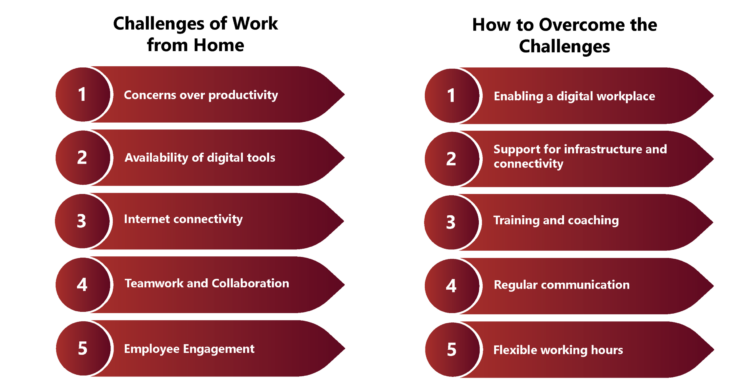1. Digital Tools and Infrastructure: Organizations must invest in the right digital tools (e.g., VPNs, web conferencing, document sharing) and ensure reliable internet connectivity to support remote work.
2. Regular Communication: Frequent communication through virtual meetings and informal interactions helps maintain teamwork, engagement, and support for remote employees.
3. Training and Support: Provide online training and coaching to help employees enhance their skills and adapt to remote work technologies.
4. Flexible Work Hours: Offering flexible schedules helps employees balance work and personal life, improving productivity and well-being.
The COVID-19 pandemic forced organizations to switch to large-scale remote working for their employees to ensure business continuity. Many experts think ‘work from home‘ will become the new normal. This comprehensive guide for implementing ‘Work from Home‘ looks at the challenges and their possible solutions.

The whole idea of ‘Work from Home‘ is based on the ability of an employee to fulfill their daily office responsibilities from their homes with the same level of efficiency and commitment.
However, to succeed in ‘Work from Home,’ organizations must provide employees with adequate support.

Allowing employees to work from home can provide multiple benefits.
Firstly, it can ensure a better work-life balance for employees, which can, in turn, impact their motivation and efficiency positively.
It can also help employees get more out of a typical workday by saving commuting time.

It can help organizations significantly reduce their real estate and overhead costs.
Therefore, it can be a win-win situation for the organizations and their employees.
Read more about the Benefits of Working from Home for organizations and employees.
The concept of ‘Work from Home‘ poses new challenges for organizations.
The most important of these challenges are as follows:

The biggest challenge faced by businesses in enabling work from home for their employees is maintaining their productivity and efficiency.
Organizations ask whether employees can work at the same level of efficiency and dedication from home as from the office.

Organizations also need to make the right digital tools and infrastructure available to employees to make it possible for them to work from home.
Employees also need to be comfortable using these technologies and tools

Internet connectivity is the most critical aspect for ensuring a smooth ‘work from home’ experience.
Arranging for a fast and stable internet connection can be a significant challenge.

Most organizations find it challenging to understand how to maintain teamwork and collaboration between members of the workforce who are working remotely.

The other challenge posed to organizations when employees work alone from home is how to keep the employees engaged and sustain the organizational culture.

The above challenges make it difficult for organizations to adopt work from home as a permanent part of their operations strategy.
However, thankfully most of these challenges can be overcome with proper planning and well-thought-through policies and processes.
Here are a few tips to help organizations get the most from their ‘work from home’ employees.
1. Enable a digital workplace
2. Support for infrastructure and connectivity
3. Training and coaching
4. Regular communication
5. Flexible working hours


Organizations need to invest in the right digital tools and technologies required for employees to work from home efficiently. Organizations should digitize all possible business processes.
They must provide employees with digital tools such as virtual private networks (VPNs), web conferencing platforms, online document storage and sharing platforms, etc.
They should have access to applications they typically use when operating from the office.
Remote technical support for these tools should also be made available.

Organizations need to formulate policies to address issues related to internet connectivity and infrastructure such as power backup.
Also, a stable internet connection from a reliable service provider is the bare minimum.

Additionally, organizations need to provide online training programs for employees for skill development and enhancement.
This should be supplemented by coaching from their supervisors and other identified subject matter experts.

Also, organizations should constantly try to assuage their remote-working employees’ discomfort through extensive communication.
Therefore, managers should conduct virtual team meetings, enable online informal interaction, recognize their efforts and achievements, and provide support and guidance.

Organizations need to adopt a more flexible approach toward the work schedules for their ‘work from home’ employees.
Hence, this would help employees with better work-life balance and maximize their productivity by adjusting their work timings.
Implementing ‘Work from Home’ may pose certain challenges for organizations; however, if planned and managed well it can yield long-term business benefits for the organizations as well as for the employees.

Lead author: Sagar Chaudhuri, the Co-Founder and CEO of HiFives. He is an HR Tech Evangelist with over 25 years of corporate and entrepreneurship experience. In the past, Sagar has worked in leadership roles with companies such as Genpact, Infosys, and ICICI Bank. He has an engineering degree from IIT Kharagpur and an MBA from IIM Lucknow. Connect on LinkedIn
To stay updated on the latest HiFives blogs, follow us on Twitter (@MyHiFives)